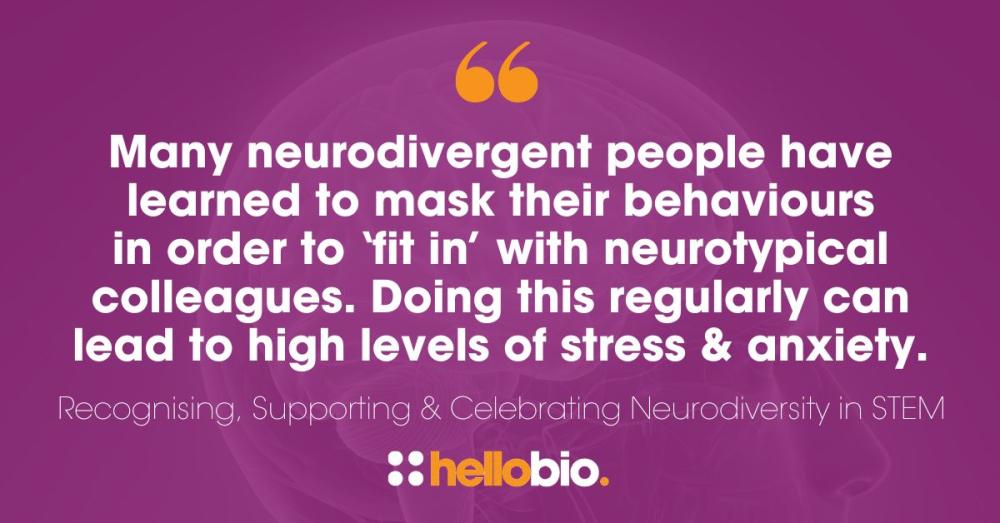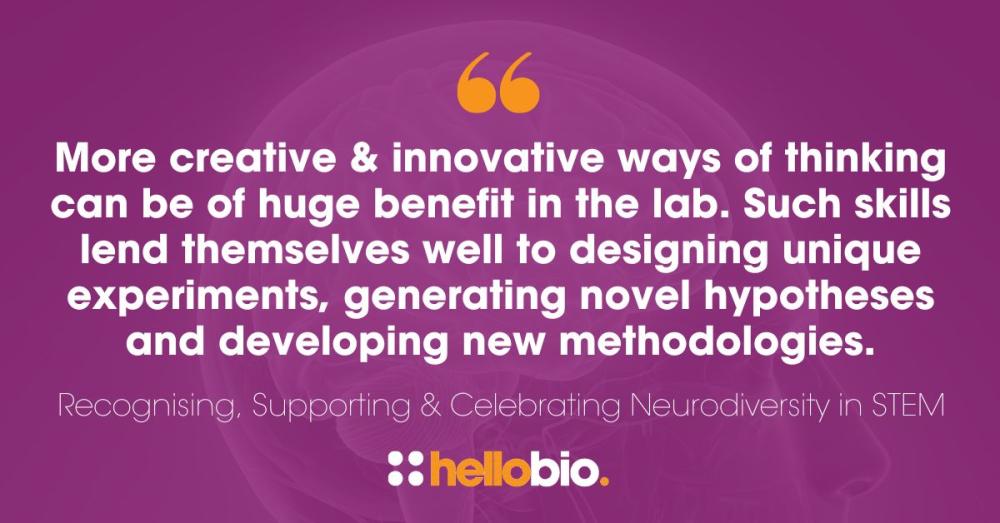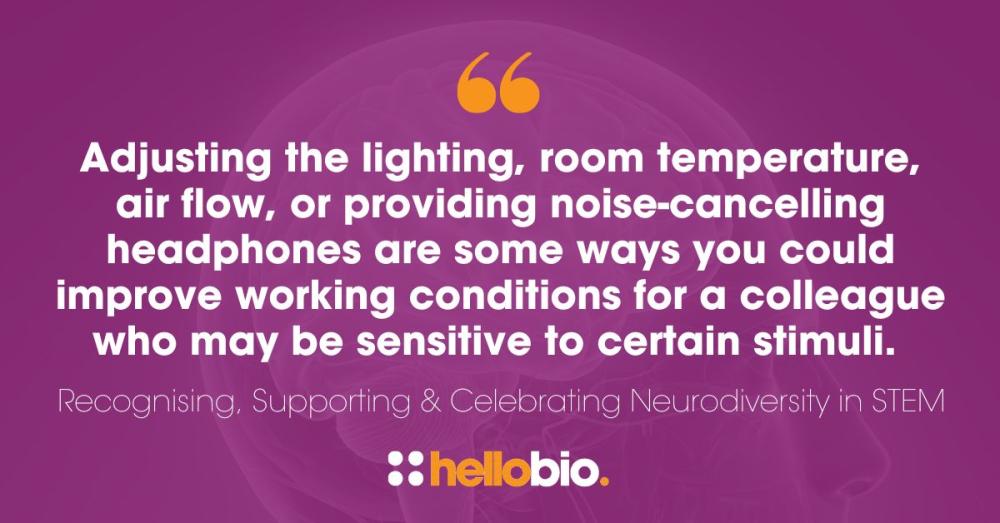Recognising, Supporting & Celebrating Neurodiversity in STEM
Awareness of neurodiversity has increased considerably in recent years, with advances in research, education, advocacy and representation all helping to highlight the experiences of neurodivergent people across society.
The outdated belief that people with neurodivergence such as autism or ADHD are in some way less capable than those deemed ‘neurotypical’ is rightly being replaced by the understanding that with the right support, people with neurodivergent brains can thrive within any working environment. In fact, in some fields of tech and computer sciences, companies are actively seeking to recruit neurodivergent people for their unique skills and abilities.
When neurodivergent employees are properly supported in the workplace, their alternative ways of thinking can bring huge value. When recognised and valued by others, neurodivergence can be a superpower, and in this article we look at some important things to consider when working with neurodivergent colleagues. We also suggest some practical ways you can make your lab more inclusive for everybody, because by accommodating those with different communication styles, learning styles and sensory needs, we can create spaces where everyone feels valued – and where amazing discoveries can happen!
What is neurodiversity vs neurodivergence?
Neurodiversity is a term used to describe the different ways in which people’s brains work. It expresses the understanding that ALL people experience and interact with the world in different ways, and celebrates these as differences rather than viewing them as deficits or disabilities.
Neurodivergence is an umbrella term for those who do not conform to ‘typical’ ways of being. Some of the most common types of neurodivergence include:
- Autism
- ADHD or ADD
- Dyslexia
- Dyspraxia
- Dyscalculia
- Tourette Syndrome
- Obsessive-Compulsive Disorder
- Sensory Processing
- Synesthesia
- Misophonia
What challenges might a neurodivergent scientist face in the lab?
Depending on their neurotype and combination or severity of traits, a neurodivergent work colleague could face a number of additional challenges in their day-to-day work in the lab. Many neurodivergent people have learned to mask their behaviours in order to ‘fit in’ with neurotypical colleagues. Doing this regularly can lead to additional stress, anxiety and mental health impact, therefore it’s important to be aware of any potential problems that might require additional support. These could include:
Sensory issues - A heightened sensitivity to sensory stimuli, such as loud noises, bright lights or strong smells. In a busy science lab, the use of heavy or noisy equipment, vibrations, bright lights, excessive heat, or strong odours from chemicals or other equipment may cause distraction or discomfort.
Repetition - Wet lab work can involve repetitive tasks such as measuring, pipetting, or mixing solutions. Repetition can be challenging for some neurodivergent individuals who might struggle to maintain focus and motivation over a long period of time. Those with ADHD or ADD may even find it difficult to physically keep still or stay seated for excessive lengths of time.
Executive function - Some neurodivergent individuals struggle with executive function skills such as time management, organisation, working memory and prioritisation of workload. Working to tight deadlines and multitasking are common requirements in a busy lab, and may cause additional stress or difficulty for some neurodivergent scientists.
Communication - Difficulty with both verbal and non-verbal communication can be an issue, including the inability to pick up on social cues, read facial expressions or express themselves clearly. When collaborating with other scientists in the lab, participating in discussions, sharing ideas or interpreting instructions might feel challenging.
Structure and routine - Some neurodivergent individuals have difficulty adapting to sudden or unexpected change, or deviating from specific thought patterns. In a fast-moving lab environment, the requirement to change focus or switch to a different process within a project or experiment might be challenging at times.
What strengths can neurodivergent scientists bring to the lab?
Having a brain which processes information in different ways may bring additional challenges, but it can also bring creativity, new ideas and fresh perspectives. There are a number of different strengths a neurodivergent scientist can bring to the lab, with certain skills and attributes being of great benefit to a lab setting, such as:
Attention to detail - The ability to identify errors, recognise patterns, or pick up on small changes in data that others might not can be beneficial when studying graphs, scans, large amounts of complex data, or other sets of results.
High levels of concentration - The ability to hyperfocus, meaning some neurodivergent people can work intensely on a task for a long period of time, can be useful in science research. Persistent levels of concentration can help when tackling complex scientific problems or analysing data.
Detailed knowledge of specialist subjects - The ability to retain large amounts of in-depth information and detail about subjects that are of specific interest is common among many neurodivergent people. This high level of connection with a topic can lead to a deeper understanding of a particular area of research.
Alternative perspectives - People with different brains can bring different perspectives to a lab project by looking at the bigger picture, using lateral thinking or approaching problems from unconventional angles.
Exceptional memory and recall - Some neurodivergent people have extraordinary memory skills, and are able to retain vast amounts of information relevant to a particular research area. Often this is accompanied by the ability to recall that data quickly, which can lead to faster problem-solving and sharing of information and ideas.
Creativity - Having exceptionally creative and innovative ways of thinking can be of huge benefit in a science lab. Such skills lend themselves well to designing unique experiments, generating novel hypotheses and developing new methodologies.
How can you create a more inclusive workplace for neurodivergent colleagues?
Awareness and recognition of neurodivergent lab colleagues’ needs is key to creating a working environment in which they will feel valued, respected and supported. Here are some things to keep in mind when working alongside a neurodivergent scientist in the lab:
Use clear communication
Be mindful about how information is communicated, and be sure to use clear and direct language. Provide written instructions where necessary and offer opportunities for details to be double-checked and clarified. PIs, lab managers and other mentors should take the time to understand the communication preferences of each individual, and adjust their mentorship style to best suit that person’s needs.
Sensory considerations
Be aware of any sensory issues and be prepared to make adjustments to the working environment where possible. Adjusting the lighting, room temperature, air flow, or providing noise-cancelling headphones are some ways you might be able to improve working conditions for a colleague who is sensitive to certain sensory stimuli. Also be mindful that overstimulation can, in extreme cases, lead to meltdowns in which a colleague may need to leave a loud or crowded space. Providing a quiet space away from the lab for breaks and respite from overstimulation is extremely helpful.
Flexibility
Allow flexibility in the way tasks are approached and completed. Neurodivergent people may have different work styles and preferences, and using different methods, techniques or even software may seem unconventional but might allow them to perform at their best. Be prepared to extend deadlines for colleagues with attention disorders, and consider ways of increasing levels of engagement by encouraging different shift patterns or adjusting the focus of a particular project.
Social support
Ensure that all colleagues within the team are supportive and understanding, and that the workplace is a space where neurodivergent colleagues can feel comfortable in expressing themselves without the need to mask or isolate themselves from others. Encourage open and honest communication and provide opportunities for everyone to speak about their needs and preferences.
Training, education & advocacy
Look for training courses or other learning opportunities around neurodiversity, and encourage all team members to participate. Increased awareness and education on the topic can help foster understanding and empathy, as well as encouraging advocacy and the promotion of wider diversity and representation in STEM.
Tell us about your experiences…
Are you a neurodivergent scientist? What challenges have you faced in the lab, and how have you and your colleagues overcome them? We’d love to hear your story! Tell us in the comments below, share with us on X(Twitter) @hello_bio, or contact us by email to write a blog or be interviewed about your experiences: hello@hellobio.com
________________________________
If you enjoyed this article, why not check out the other resources available on our blog. We are passionate about supporting life scientists including early career life scientists and PhD students - with really low-priced reagents, antibodies and biochemicals, early career scientist grants, and resources to help with both personal and professional development. We know how tough it is - so we hope you find these helpful!
More General Support for Life Scientists
For advice on wellbeing, dissertations, presenting at conferences, wellbeing, PhD support, networking and lots more, we have a huge range of articles to help - just click below:
Save up to 50% on our high purity reagents...
When you get to the stage of planning your experiments, don't forget that we offer a range of low-cost, high-purity agonists, antagonists, inhibitors, activators, antibodies and fluorescent tools (yes - they really are around half the price of other suppliers!) You can use our Quick Multi-Search Tool to search for lots of products in one go, and the range includes:
- Enzyme inhibitors and activators
- Chemogenetic ligands
- Ion channel modulators
- GPCR & ionotropic receptor ligands
- Cell biology reagents & biochemicals
Technical resources
Try our Molarity Calculator: a quick and easy way to calculate the mass, volume or concentration required for making a solution.
Try our Dilution Calculator: an easy way to work out how to dilute stock solutions of known concentrations
We also offer a comprehensive range of technical resources including antibody protocols and methods, product guides and mini-reviews:
And finally, don't forget to check back in with our blog regularly for our latest articles. If there’s something you’d love to contribute to the community, whether that’s an interview or article, drop us a line at hello@hellobio.com
---






















